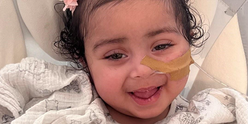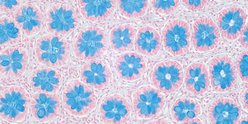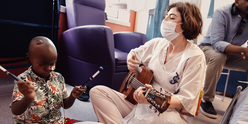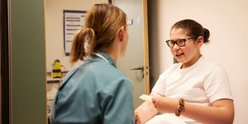GOSH Charity gives £2.4m to pioneering clinical trial for children with aggressive blood cancer
14 Oct 2024, 11:20 a.m.
At GOSH Charity, we strive to give seriously ill children the best chance and the best childhood possible.
As the UK’s largest dedicated funder of child health research, we stop at nothing to help deliver the medical breakthroughs and research-led care seriously ill children need.
We’ve just launched our first ever cancer research strategy, pledging a minimum of £15 million in this area.
In line with this new strategy, we’re funding a pioneering phase I clinical trial for children with T-cell acute lymphoblastic leukaemia (T-ALL) - run by Dr Sara Ghorashian (pictured above) and her team.
Below, we explore what this trial will involve and meet Maris, whose son Frank passed away in 2019 from T-ALL.
Potential for new treatment and more efficient trial design
Researchers at Great Ormond Street Hospital (GOSH) and University College London (UCL) are collaborating on a novel approach to clinical trials to give hope to children with an aggressive type of blood cancer, T-ALL.
Thanks to £2.4 million of our funding, Dr Ghorashian, a Consultant Haematologist at GOSH, and her team from GOSH and the UCL Great Ormond Street Institute of Child Health, will run a trial for young people whose T-ALL relapses or is resistant to conventional treatments, including chemotherapy and bone marrow transplant.
There is currently no standard of care for these children, and long-term survival can be as low as 30%.
This paediatric study will open at both GOSH and University College London Hospital (UCLH), meaning children aged up to 18 will have the opportunity to be involved.
As well as potentially providing a new treatment option for children and young people with relapsed T-ALL, this paediatric clinical trial is also adopting a novel approach which will see it running alongside an adult’s clinical trial (taking place at UCLH) for the first time in the hope of creating a more efficient trial design.
Dedicated research projects for children’s cancers are rare, with paediatric clinical trials traditionally starting later than adults’ and taking an average of six and a half years longer to complete.
Although cancer is the biggest killer of children aged one to 14 in the UK, only 12 anti-cancer medicines have been authorised for paediatric cancer specifically in the last 10 years, compared to over 150 for adult cancers.
Too often 'unacceptable’ wait for children to access new treatment
The phase 1 clinical trial will treat 12 children with relapsed T-ALL. It will test the effectiveness of a CAR T-cell therapy targeted at a specific protein called CCR9, that has been newly identified by researchers at UCL to occur exclusively on cancerous T-cells.
Through the trial, Dr Ghorashian and her team hope to develop a new treatment that is more effective and targeted than current options.
CAR T-cell therapy, which involves genetically modifying the body’s immune cells to recognise and kill cancer cells, has already shown remarkable success in children with B-cell acute lymphoblastic leukaemia.
This has proven difficult to replicate in T-ALL, though, due to the CAR T-cells targeting either each other or the healthy T-cells, weakening the immune system even further. But with the recent discovery of the CCR9 protein, there is now a promising, clearer target.
Not only will this new trial design potentially result in significant cost and time-savings, it will help ensure that children and adults have access to targeted therapies at the same time on the NHS.
This is a step change from traditional clinical trial methods where adults take part first, which can mean that children don’t even get the opportunity to try these potential treatment options if the trial fails in adults. This is particularly pertinent as children and young people often tolerate CAR T-cell therapy more robustly than adults.
Dr Sara Ghorashian says of the trial: “Too often, children wait unacceptable amounts of time to access new cancer treatment which could make all the difference.
“This study will pave the way for research to always include children and make it a matter of course that both paediatric and adult patients are incorporated within clinical trials at the same time.
“Our goal is to never have a situation where children are left behind and we hope that we can prove the benefit of this novel approach to influence a change in the law in the future.”
A mother's mission to help others in her son's memory

One family that understands the urgent need for child-focused research is Maris and her husband Aivar, whose son Frank passed away from T-ALL in 2019, only months after receiving his initial diagnosis.
Born in 2017, Frank was a child who rarely got ill. But just before he turned two, he developed a cold and his health deteriorated on a flight to celebrate his upcoming birthday with relatives and close friends in Estonia. Blood tests at a local hospital revealed he had T-ALL.
Instead of enjoying his birthday party, two days later Frank was rushed to GOSH by air ambulance. There, he started intensive chemotherapy treatment to tackle the aggressive cancer that was spreading throughout his body. Frank unfortunately didn’t respond to treatment and passed away in his family's arms four months later.
“When Frank was diagnosed, I felt like my legs were taken out from under me,” Maris says. “Even when the leukaemia spread to his brain, we still had hope. We hoped there would be a miracle; that something would click and Frank would get better. But there comes a point when you can no longer treat the child if it means they’ll have no quality of life.
“Every parent wants to have their child no matter what, and it is the most difficult thing in the world to let go, but you also don’t want them to suffer and have to let nature take its course.”
Since Frank passed away, Maris has dedicated her life to raising vital funds and awareness for GOSH Charity, to help fund more pioneering research for children with rare and difficult-to-treat cancers.
“As a grieving parent, it’s incredibly important to me that I can see something is happening and progress is being made with children’s cancer research,” she says.
“People often ask me how I feel when I see some new research or treatment that could have saved Frank, and they expect to me to say, ‘why me’. While of course I wish there had been a treatment available for Frank at the time, I am so happy to see these treatments being developed.
“When I see another child pass away, I live through that same devastation as when we lost Frank. Whereas, when children get help and other parents don’t have to experience what we will go through for the rest of our lives, it’s the best feeling for me.
“I feel like I have an obligation to get people to understand the need for more research into children’s cancers, so that children don’t get left out in any way and can benefit from better treatments. Also, it makes me feel that I am still able to do something for Frank as he would want me to carry on his voice and seek help for others. That’s my mission.”
A world-leading new Children’s Cancer Centre at GOSH
Improving the lives of children with cancer is at the centre of our biggest ever fundraising appeal, to help build a world-leading new Children’s Cancer Centre at GOSH and transform children’s cancer care.
Designed with the needs of children and families at its heart, the Children’s Cancer Centre will support every aspect of care for children and their families, from diagnosis to remission, and help to offer opportunities for children to participate in research.
“This game-changing new facility will help enable pioneering research to take place to deliver new breakthrough therapies for children who desperately need them,” Dr Aoife Regan, GOSH Charity’s Director of Impact and Charitable Funding, says.
With the required funding in place, the FRACTALL clinical trial is now going through all the necessary reviews and approvals with the expectation that it will open in early 2025. Any patients eligible to receive treatment under the NHS and interested in this trial should approach their specialist healthcare provider. In the interim, clinical teams will be happy to discuss alternative trials that are currently open for children with T-ALL.






